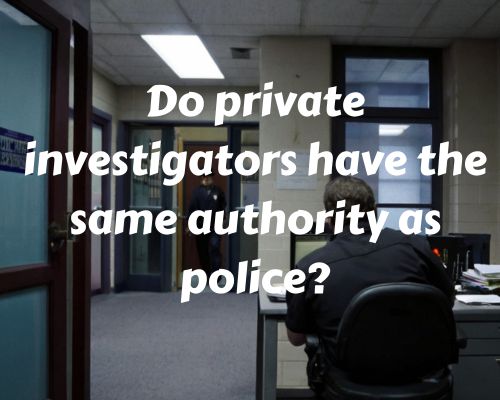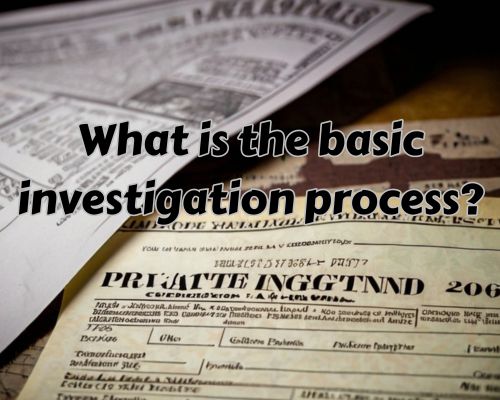“Private investigators and police officers may both operate in the realm of justice, but they do not share the same legal authority. Unlike police officers, private investigators (PIs) lack the power to make arrests or enforce the law. Their role involves gathering information within legal boundaries, often requiring appropriate licenses and adherence to strict regulations.” said Charles Jimerson from Private Investigator West Palm Beach.

You might think a PI’s role and methods mirror those of police investigators, but there are significant differences. Police have broader legal powers, including carrying badges and firearms, making arrests, and accessing certain government databases. PIs, on the other hand, must rely on their investigative skills, legal methods, and the authority granted by their clients.
Despite these differences, there are similarities between the two. Both strive to uncover the truth and can sometimes use overlapping techniques such as surveillance and interviews. Information collected by a PI can aid police investigations, making their work complementary in certain situations. This dynamic interplay between private investigators and police highlights the distinct yet interrelated roles each plays in the pursuit of justice.
Roles and Limitations of Private Investigators Versus Police Officers
Private investigators (PIs) and police officers operate within different frameworks and possess varied levels of authority and jurisdiction. Their methodologies and specializations further distinguish their roles. Let have it with Charles Jimerson from Private Investigator West Palm Beach.
Authority and Jurisdiction Differences
Police officers are sworn law enforcement professionals empowered by governmental bodies with the authority to enforce laws, make arrests, and execute warrants. They have jurisdiction within specific geographical boundaries, such as city or state limits.
In contrast, private investigators function within the private sector, subject to state and federal regulations. They lack arrest powers and must operate within strict legal boundaries. They cannot obtain search warrants and must avoid actions like trespassing.
Scope of Work and Methods Employed
Police officers focus on criminal investigations and maintaining public order. Their resources include access to databases, forensics labs, and specialized unit teams.
Private investigators delve into personal, business, and legal matters for individual clients or companies. They conduct surveillance, perform background checks, and gather evidence using various methods, such as interviews and research. The tools they employ, while robust, are often more limited than those available to police.
Specializations and Types of Cases Handled
PIs often specialize in fields like infidelity, insurance fraud, or missing persons. They work for attorneys, individuals, and law firms on matters ranging from civil disputes to financial investigations.
Police officers, on the other hand, deal with a broader spectrum of criminal activity. Their cases include homicide, theft, and other crimes requiring immediate law enforcement intervention. They also engage in long-term investigations and work on “cold cases.”
Legal and Ethical Considerations in Private Investigation
When hiring a private investigator, it is essential to consider the legal and ethical parameters they must adhere to. This includes respecting confidentiality, operating within legal boundaries, and cooperating with law enforcement and the justice system.
Confidentiality and Privacy Laws
Confidentiality is a cornerstone in private investigation. Licensed private investigators must protect sensitive information and respect privacy rights. Understanding laws about privacy, such as one-party consent and two-party consent for recording conversations, directly impacts their work.
Failure to adhere to these laws can lead to significant legal repercussions, including fines and jail time. Corporations often hire private detectives to safeguard proprietary information. Missteps in handling data can damage trust and lead to lawsuits.
Licensing, Regulations, and Compliance
Private detectives must comply with local licensing requirements and regulations. Most jurisdictions mandate specific certifications and ongoing legal compliance for licensed private investigators. This ensures they operate within the legal scope of their work.
Legal matters such as carrying firearms and the use of certain technologies are tightly regulated. Compliance is essential for maintaining the investigator’s legal standing and the admissibility of their findings in court. Regular updates on regulations and protocols are necessary to prevent issues during investigations.
Collaboration with Law Enforcement and the Justice System
Collaboration with police investigators and the justice system is often inevitable for thorough investigations. PIs must understand the protocols of reporting findings and cooperating with law enforcement personnel.
This collaboration ensures that their evidence is handled correctly and is admissible in legal matters.
Private investigators cannot issue citations or respond to emergency calls like police detectives. However, they play a crucial supporting role in gathering intelligence and providing information.
Proper coordination with law enforcement enhances the effectiveness and legality of the investigation, benefiting justice and truth.


